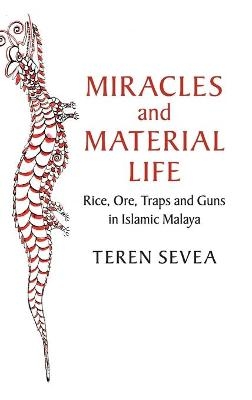
Miracles and Material Life
Rice, Ore, Traps and Guns in Islamic Malaya
Seiten
2020
Cambridge University Press (Verlag)
978-1-108-47718-5 (ISBN)
Cambridge University Press (Verlag)
978-1-108-47718-5 (ISBN)
Through a close textual analysis of hitherto overlooked Malay Islamic manuscripts, Teren Sevea reveals the economic, environmental and religious significance of Islamic miracle workers (pawangs) across the Indian Ocean world and on the frontier of the British Empire in the nineteenth and twentieth century.
In this ground-breaking new study, Teren Sevea reveals the economic, environmental and religious significance of Islamic miracle workers (pawangs) in the nineteenth- and twentieth-century Malay world. Through close textual analysis of hitherto overlooked manuscripts and personal interaction with modern pawangs readers are introduced to a universe of miracle workers that existed both in the past and in the present, uncovering connections between miracles and material life. Sevea demonstrates how societies in which the production and extraction of natural resources, as well as the uses of technology, were intertwined with the knowledge of charismatic religious figures, and locates the role of the pawangs in the spiritual economy of the Indian Ocean world, across maritime connections and Sufi networks, and on the frontier of the British Empire.
In this ground-breaking new study, Teren Sevea reveals the economic, environmental and religious significance of Islamic miracle workers (pawangs) in the nineteenth- and twentieth-century Malay world. Through close textual analysis of hitherto overlooked manuscripts and personal interaction with modern pawangs readers are introduced to a universe of miracle workers that existed both in the past and in the present, uncovering connections between miracles and material life. Sevea demonstrates how societies in which the production and extraction of natural resources, as well as the uses of technology, were intertwined with the knowledge of charismatic religious figures, and locates the role of the pawangs in the spiritual economy of the Indian Ocean world, across maritime connections and Sufi networks, and on the frontier of the British Empire.
Teren Sevea is a historian of religion in South and Southeast Asia at the University of Pennsylvania. He is the author of publications on Islamic connections of the Indian Ocean world, Sufism and Sufis of the Malay world, Islamic reform movements and Islamic erotology.
The magic of Islam and modern Malaya: an introduction; 1. Compendia of forest patois and agrarian 'Iimu; 2. Pawangs and Munshis in Muhammad's ricefields; 3. The Pawang's 'wonderful nose' for ore; 4. An 'ilmu of violence: the elephant bomohs of modern Malaya; 5. Gun gurus and Sufi shooters; Conclusion.
| Erscheinungsdatum | 31.07.2020 |
|---|---|
| Reihe/Serie | Asian Connections |
| Zusatzinfo | Worked examples or Exercises; 2 Maps; 10 Halftones, black and white |
| Verlagsort | Cambridge |
| Sprache | englisch |
| Maße | 158 x 236 mm |
| Gewicht | 560 g |
| Themenwelt | Geisteswissenschaften ► Geschichte ► Regional- / Ländergeschichte |
| Geschichte ► Teilgebiete der Geschichte ► Wirtschaftsgeschichte | |
| Geisteswissenschaften ► Religion / Theologie ► Islam | |
| ISBN-10 | 1-108-47718-6 / 1108477186 |
| ISBN-13 | 978-1-108-47718-5 / 9781108477185 |
| Zustand | Neuware |
| Informationen gemäß Produktsicherheitsverordnung (GPSR) | |
| Haben Sie eine Frage zum Produkt? |
Mehr entdecken
aus dem Bereich
aus dem Bereich
Macht und Herrschaft im Zarenreich
Buch | Hardcover (2024)
C.H.Beck (Verlag)
49,90 €
wie die USA und China um die technologische Vorherrschaft auf der …
Buch | Hardcover (2023)
Rowohlt (Verlag)
30,00 €


